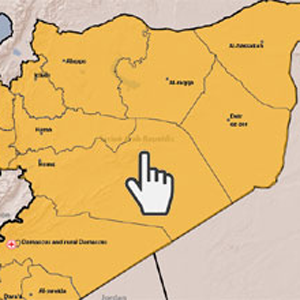 NEWS
NEWS
 NEWS
NEWS
 NEWS
NEWS
![]() The AP is now reporting that Syria has dropped off the Internet as the government imposed a blackout over the entire nation’s critical communications from Internet to cellphones services (in select areas.) Thursday, rebels and government troops are engaged in warfare in the streets that have even strayed near the capital’s airport—suspending air traffic for the time being as well.
The AP is now reporting that Syria has dropped off the Internet as the government imposed a blackout over the entire nation’s critical communications from Internet to cellphones services (in select areas.) Thursday, rebels and government troops are engaged in warfare in the streets that have even strayed near the capital’s airport—suspending air traffic for the time being as well.
The outage in Syria has been confirmed by multiple sources, including Akamai Technologies Inc., a well known Internet data distributor who constantly monitor networks in order to get the best bandwith for their customers delivery. Renesys, another US-based network security firm, also confirmed stating that Syria effectively vanished Thursday at 12:26 p.m. local time.
“In the global routing table, all 84 of Syria’s IP address blocks have become unreachable, effectively removing the country from the Internet,” Renesys said.
Also according to Renesys, there are a few live Syrian networks, all of which belong to Tata Communications:
“These are potentially offshore, rather than domestic, and perhaps not subject to whatever killswitch was thrown today within Syria. These five offshore survivors include the webservers that were implicated in the delivery of malware targeting Syrian activists in May of this year,” writes the company.
State Controlled Killswitches Part of Warfare
We’ve seen the use of a killswitch before to cut off internal communication to local populations used before by countries seeking to control their territory.
In January 2011, Egypt used a killswitch to cut off communications over their Internet during the popular uprisings. The act led to a massive loss of data from the state and a return to oldschool journalism and communication (those without the Internet) although information still flowed out of and into the state.
Libya suffered under a six-month blackout imposed by their government in 2011 as well, restored in August of that year. The Libyan government had cut off the Internet in their own country due to a very similar reason to Egypt’s blackout: to control and pacify rebels fighting in their streets.
The World Watches the Darkened Syria
Even with cell service and Internet cut, there are still telephone cables running in and out of Syria and activists have gone to those in order to maintain communication with the outside world. Also, there’s no news that the Syrian government is jamming radio or satellite communications. It will be even harder than before to be part of the global community for local residents; but many of them probably have a lot more to worry about with fighting outside their doors.
Cutting off an entire country from the Internet and the rest of the world at large feels like a heavy door shutting. It throws news and communication to that country back to pre-1990 levels of newsmaking and renders the populations cut off from the rest of the globe. Fortunately, the Internet is a brand new medium for communication and news delivery and wartime journalism hasn’t changed that much (after all news got out during World War II.)
We’ll be watching to see how groups such as Anonymous and others respond to this. In the past, they have reacted by hitting government websites or financial institutions owned by the states in question; however, without the Internet flowing to them, those institutions lack their fundamental vulnerability to hackers (and they’re already without communication anyway.)
We also expect that groups such as Anonymous might become distributors of information into and out of Syria, including information on how activists and people can get news out as they have done in the past.
Support our mission to keep content open and free by engaging with theCUBE community. Join theCUBE’s Alumni Trust Network, where technology leaders connect, share intelligence and create opportunities.
Founded by tech visionaries John Furrier and Dave Vellante, SiliconANGLE Media has built a dynamic ecosystem of industry-leading digital media brands that reach 15+ million elite tech professionals. Our new proprietary theCUBE AI Video Cloud is breaking ground in audience interaction, leveraging theCUBEai.com neural network to help technology companies make data-driven decisions and stay at the forefront of industry conversations.